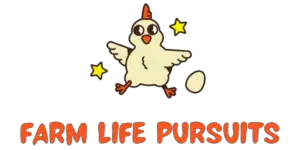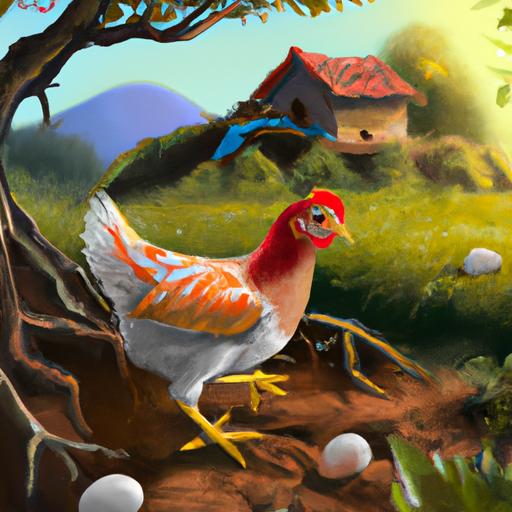For any chicken owner, its heartbreaking to see one of your beloved birds decline in health.
But its essential to be able to recognize the warning signs of a dying chicken before its too late.
In this article, well cover the common signs of a dying chicken, such as listlessness, lack of appetite, labored breathing, and diarrhea or swollen joints.
Well also discuss what to do if you find a dead chicken, and how to isolate sick birds to prevent the spread of disease.
So read on to learn how to tell if your chickens are in decline and what you can do to help them.
Table of Contents
Short Answer
The most common signs of chickens dying are decreased physical activity, difficulty breathing, decreased appetite, a decrease in egg production, and discoloration of the comb and wattle.
Other signs to look out for include a decrease in vocalization, labored breathing, and isolation from the rest of the flock.
If you notice any of these signs, consult a veterinarian as soon as possible to help diagnose and treat the issue.
Signs of a Dying Chicken
When it comes to identifying if a chicken is dying, there are a few common signs to look out for.
Listlessness, lack of appetite, labored breathing, diarrhea, and swollen joints are all possible indications that a chicken may be dying.
Listlessness is a common sign of a dying chicken and is characterized by a lack of energy, reduced activity, and a flat demeanor.
Chickens that are lethargic and have stopped eating or drinking are likely in their final stages of life.
Labored breathing is another sign of a dying chicken.
Chickens often display labored breathing when they are in distress, which is often a symptom of a serious underlying health issue.
Diarrhea is another possible sign of a dying chicken as it can be an indication of a severe infection.
Finally, swollen joints can be a sign of a dying chicken as it can indicate an underlying infection or trauma.
When a chicken is found dead, it is important to inspect it for parasites, wounds, and other signs of infection.
These signs can provide clues as to the cause of death, and can help to inform treatment for the rest of the flock.
It is also important to isolate any sick birds from the rest of the flock to prevent the spread of disease.
By being able to recognize the signs of a dying chicken and taking prompt action, you can help protect the health of your flock.
Listlessness

When it comes to knowing how to tell if chickens are dying, one of the most obvious signs to look for is listlessness.
Chickens that are dying will often have a lack of energy and seem uninterested in their surroundings.
They may stay in one spot for long periods of time and not move around much.
Other signs of listlessness in a chicken include a decrease in vocalization, a decrease in social interaction with other chickens, and a decrease in egg production.
If your chickens start to show any of these signs, it may be a sign that something is wrong and you should take action quickly.
Additionally, you should monitor their food and water intake as a decrease in either of these can also be a sign that a chicken is sick or dying.
Lack of Appetite
It is important to be able to recognize when a chicken is not eating as this could be a sign of illness or death.
Chickens that are ill will often lose their appetite, so if you notice one of your birds not eating, it is important to investigate further.
A healthy chicken should be actively searching for food and eating throughout the day.
If a chicken is not eating, it could be a sign of an underlying health condition.
Look for other signs in addition to a lack of appetite.
If a chicken appears listless or lethargic, has labored breathing, or has swollen joints, these could also indicate an underlying health issue.
It is important to isolate any chickens that appear to be ill in order to prevent the spread of disease.
If you notice chickens that are not eating, it is important to take action quickly in order to prevent further illness or death in the flock.
If you find a dead chicken, it is important to inspect it for parasites, wounds, or other signs of infection.
This will help you determine the cause of death and take steps to prevent any further illness in the flock.
It is also important to quarantine any sick birds so that they cannot spread disease to the other chickens.
By being able to recognize the signs of a dying chicken and taking prompt action, you can help protect the health of your flock.
Labored Breathing

When it comes to chickens, labored breathing is one of the most common warning signs of death.
Labored breathing may appear as panting, gasping, or wheezing, and it can be a sign of a variety of illnesses, such as bacterial or viral infections, heart disease, or parasites.
If a chicken is laboring to breathe, the wings may be held out or down, and the beak may be open.
If you notice any of these symptoms, you should isolate the chicken from the rest of the flock and contact a vet for further diagnosis and treatment.
Additionally, if you find a dead chicken, it is important to inspect it for signs of labored breathing, as this can provide clues as to the cause of death.
Diarrhea or Swollen Joints
One of the most common signs of a dying chicken is diarrhea or swollen joints.
Diarrhea can be a sign of an infection, dehydration, or even a dietary issue.
Swollen joints can also be indicative of an infection as well as arthritis.
If you notice either of these symptoms in your chickens, it is important to take action quickly.
Diarrhea in chickens is often caused by a bacterial or viral infection.
If left untreated, it can quickly lead to dehydration and death.
To help prevent this, it is important to keep your chickens in a clean environment and provide them with plenty of fresh water.
If you notice diarrhea in your flock, it is also important to isolate any affected birds from the rest of the flock to prevent the spread of infection.
Swollen joints can also be a sign of infection or arthritis.
If you notice that one of your chickens joints is swollen, it is important to inspect it for any signs of infection.
This could include redness, tenderness, or even discharge.
If the swelling is caused by an infection, it is important to treat it as soon as possible with antibiotics or other medications.
If the swelling is caused by arthritis, it is important to give your chicken plenty of rest and provide them with supportive treatments such as glucosamine supplements.
By being able to recognize the signs of a dying chicken and taking prompt action, you can help protect the health of your flock.
If you notice either of these symptoms in your chickens, it is important to take action quickly by isolating any affected birds and seeking veterinary care if necessary.
By doing so, you can help ensure the health and safety of your flock.
Inspecting a Dead Chicken

When inspecting a dead chicken, it is important to check for any potential signs of infection.
This includes looking for parasites, wounds, or other abnormalities.
If any of these signs are found, it is essential to isolate the affected bird from the rest of the flock to prevent the spread of disease.
It is also important to remove the dead bird from the flock as soon as possible.
In addition to checking for signs of infection, it is also important to look for any physical signs of distress.
This includes checking for emaciation, deformities, discoloration, or any other signs that the bird was in poor health before it died.
It is also important to take note of any unusual behavior that could have contributed to the bird’s death.
Finally, it is important to look for any signs of trauma.
This includes checking for signs of injury, such as broken bones, bruises, or open wounds.
It is also important to look for any signs of suffocation or poisoning, such as discoloration around the beak or eyes.
By being able to recognize the signs of a dying chicken and taking prompt action, you can help protect the health of your flock.
Isolating Sick Birds
When it comes to caring for chickens, one of the most important things you can do is make sure to isolate any sick birds from the rest of the flock.
This will help to protect the health of the chickens and prevent the spread of disease.
If a chicken is found dead, it is important to inspect it for parasites, wounds, or other signs of infection.
Isolating any sick birds from the rest of the flock can help prevent the spread of disease and protect the health of your chickens.
When isolating a sick bird, it is important to make sure that it is in a clean and comfortable area.
This area should be away from the rest of the flock and provide plenty of fresh air and sunlight.
Provide the bird with plenty of food and water, making sure to check them regularly.
It is also important to keep the area clean and disinfected, and to make sure that the sick bird is not exposed to any other birds.
Finally, it is important to monitor the bird’s progress and take it to a veterinarian if needed.
In some cases, sick chickens can be treated and the flock can be protected from further spread of disease.
However, in some cases, the chicken may need to be euthanized.
It is important to make sure that you understand the signs of a dying chicken and take prompt action to protect the health of your flock.
Final Thoughts
It is important to be able to recognize the signs of a dying chicken and take prompt action to protect the health of the rest of the flock.
By paying close attention to your chickens and taking note of any changes in their behavior, you can more easily identify any signs of illness or death in them.
If you suspect a chicken is dying, it is important to isolate the bird from the rest of the flock and inspect it for parasites, wounds, or other signs of infection.
By taking these steps, you can help protect the health of your flock and ensure the safety of your chickens.

